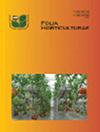鸢尾和家蝇F1、F2和BC1后代的减数分裂行为和花粉育性
IF 1.8
4区 农林科学
Q2 HORTICULTURE
引用次数: 2
摘要
花粉特征对鸢尾种间杂交具有重要意义。对黄花鸢尾(Y2)、家蝇(S3)及其杂种F1、F2和BC1 (BC1- y和BC1- s)的花粉活力和雄性减数分裂进行了研究。BC1-Y杂交种的花粉活力高于F1、F2和BC1-S杂交种的花粉活力,介于二角家蝇(26.1%)和家蝇(35.1%)之间。2个不育杂种F2-1和BC1-S-1的减数分裂异常发生率分别为57.3%和58.7%。在鸢尾属植物第一次减数分裂中,首次观察到弥漫性二倍体期。减数分裂异常包括染色体不重合、染色体桥、染色体滞后、不等分裂、纺锤体纤维定向异常、分裂不同步和多体,导致花粉育性降低。杂种BC1-Y-2、BC1-Y-1、BC1-S-2、BC1-S-3和BC1-S-4的2n花粉粒频率较高。本研究为鸢尾属植物减数分裂行为和花粉育性研究提供了新的资源。本文章由计算机程序翻译,如有差异,请以英文原文为准。
Meiotic behaviour and pollen fertility of F1, F2 and BC1 progenies of Iris dichotoma and I. domestica
Abstract Pollen characteristics are very important for Iris interspecific hybridisation. In this study, the pollen viability and male meiosis were studied in yellow-flowered Iris dichotoma (Y2), I. domestica (S3) and their hybrids F1, F2 and BC1 (BC1-Y and BC1-S). The BC1-Y hybrids showed higher pollen viability than that of F1, F2 and BC1-S hybrids, which were between I. dichotoma (26.1%) and I. domestica (35.1%). Two sterile hybrids, F2-1 and BC1-S-1, exhibited more meiotic abnormalities (57.3% and 58.7%) than other individuals. During the first meiotic division, a diffuse diplotene stage was observed for the first time in the genus Iris. The meiotic abnormalities included non-congressed chromosomes, chromosome bridges, lagging chromosomes, unequal division, abnormally oriented spindle fibres, nonsynchronous division and polyad, and resulted in reduced pollen fertility. The relatively high frequency of 2n pollen grains was found in hybrids of BC1-Y-2, BC1-Y-1, BC1-S-2, BC1-S-3 and BC1-S-4. Our research provides a new resource for meiotic behaviour and pollen fertility of the genus Iris.
求助全文
通过发布文献求助,成功后即可免费获取论文全文。
去求助
来源期刊

Folia Horticulturae
Agricultural and Biological Sciences-Horticulture
CiteScore
3.40
自引率
0.00%
发文量
13
审稿时长
16 weeks
期刊介绍:
Folia Horticulturae is an international, scientific journal published in English. It covers a broad research spectrum of aspects related to horticultural science that are of interest to a wide scientific community and have an impact on progress in both basic and applied research carried out with the use of horticultural crops and their products. The journal’s aim is to disseminate recent findings and serve as a forum for presenting views as well as for discussing important problems and prospects of modern horticulture, particularly in relation to sustainable production of high yield and quality of horticultural products, including their impact on human health.
 求助内容:
求助内容: 应助结果提醒方式:
应助结果提醒方式:


